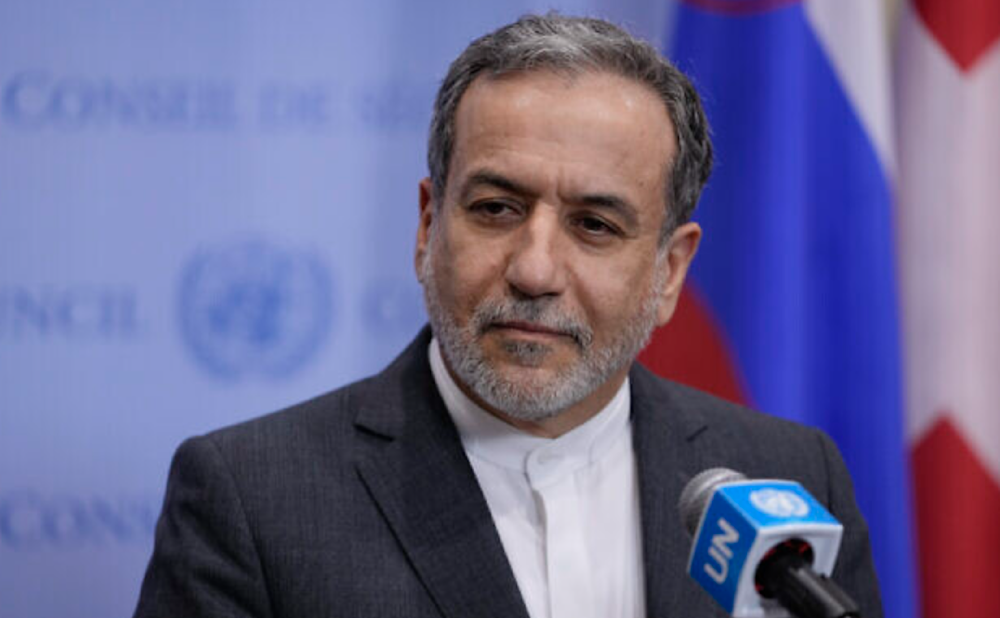Araghchi: Trust in exchange for sanctions relief
Iran's foreign minister emphasizes that Iran's nuclear program is peaceful and that the government places no restrictions on itself within the context of peaceful purposes.
-

Iranian Foreign Minister Abbas Araghchi speaks during a news conference on September 25, 2024 at the UN headquarters. (AP)
Iranian Foreign Minister Abbas Araghchi has emphasized Tehran's readiness to engage in fair discussions about the easing of sanctions.
In an interview with Tasnim, Araghchi stated that the possibility of a new round of discussions on Iran's nuclear program and the lifting of sanctions on Tehran will be determined by how prepared the other side is, given that US President-elect Donald Trump will take office in a few weeks.
Iran has never rejected the option of discussions, according to the foreign minister, adding that the fundamental idea is that the conversations must be conducted in a dignified and fair manner, with respect for the Iranian people's rights and adherence to Iran's red lines.
Any new conversations should not be a waste of time, should not be kept for another round of negotiations, and should not devolve into an attrition process, he added.
Iran has never left the negotiation table because it has always been confident in the peaceful nature of its nuclear program, Araghchi said.
Force, pressure, sanctions are futile
The foreign minister stated that Iran's continuous attitude in negotiating the Joint Comprehensive Plan of Action (JCPOA) has been to develop trust in Tehran's nuclear program in exchange for the lifting of sanctions.
He cautioned the other sides that using force, pressure, and sanctions against Iran would be futile, stating, citing that the more sanctions are applied, the more resistance Iran will show, detailing how Trump's approach of maximum pressure implemented throughout his first term, was met with utmost opposition from Tehran.
“If they (the US) take that same path (of pressures) again now, our response will conform to that path too. But if they opt for the course of fair, just, and dignified negotiations and speak with the language of respect, we will speak that language as well and pursue the path leading to the fulfillment of the interests of Iranian people," he said.
The foreign minister emphasized that Iran's nuclear program is peaceful and that the government places no restrictions on itself within the context of peaceful purposes. “We operate within that scope. Those who have concerns are welcome to come forward so we can discuss and negotiate to address their worries.”
In other statements, Iran's top diplomat praised the country's defense and missile capabilities, claiming that diplomacy is founded on might, explaining how Iran's missile capabilities are the reason there are any negotiations.
"If they could destroy our nuclear facilities with a military strike, why would they bother sitting down with us for over two years to negotiate? Why would the US secretary of state or the foreign ministers of the G5+1 gather for 18 days to reach an agreement? "
He expressed how Iran's ability to respond to any threat has been a "protective shield" for its nuclear facilities.
When questioned about the Resistance and its future in light of recent events, Araghchi detailed how it is based on justice and rights, referring to it as a "light that cannot be extinguished."
Despite facing some setbacks, he noted that Resistance ideology is very much alive and affirmed how for 80 years the Palestinian struggle and cause have not been forgotten and Palestinians continue to pursue their right to self-determination, despite the crimes of the Israeli regime during this time.
Iran rejects E3 allegations of JCPOA non-compliance
Last month, Iran's ambassador to the United Nations Saeed Iravani strongly rejected accusations by France, the UK, and Germany (the E3) that Tehran is failing to comply with its commitments under the 2015 nuclear deal, formally known as the Joint Comprehensive Plan of Action (JCPOA).
In a letter to UN Secretary-General Antonio Guterres and Security Council President Linda Thomas-Greenfield, Iravani slammed the E3 for breaching their own obligations under the agreement and urged a renewed focus on mutual diplomacy.
What were the E3's allegations?
In a joint letter sent to Guterres on December 6, the E3 claimed that Iran had significantly escalated its nuclear activities in violation of the JCPOA and UN Security Council Resolution 2231.
They cited Iran's enrichment of uranium to 60% purity, the expansion of enrichment activities at facilities like Fordow, and reduced cooperation with the International Atomic Energy Agency (IAEA), asserting that these actions posed serious proliferation risks and lacked a credible civilian purpose despite the absence of concrete evidence to support their claims.
In his letter dated December 9, Iravani described the E3's claims as "baseless" and argued that their stance ignores Iran's sustained efforts to uphold the agreement, despite the US' withdrawal in 2018 and the imposition of severe sanctions.
"The Islamic Republic of Iran categorically rejects the claims in the E3 letter regarding Iran's alleged non-compliance with its commitments under the JCPOA," Iravani wrote.
"Any allegation regarding Iran's implementation of its JCPOA commitments is fundamentally flawed when divorced from the full context of the US withdrawal. Such a claim ignores Iran's sustained efforts to uphold the deal despite persistent provocations and violations by the US and E3/EU."

 5 Min Read
5 Min Read








